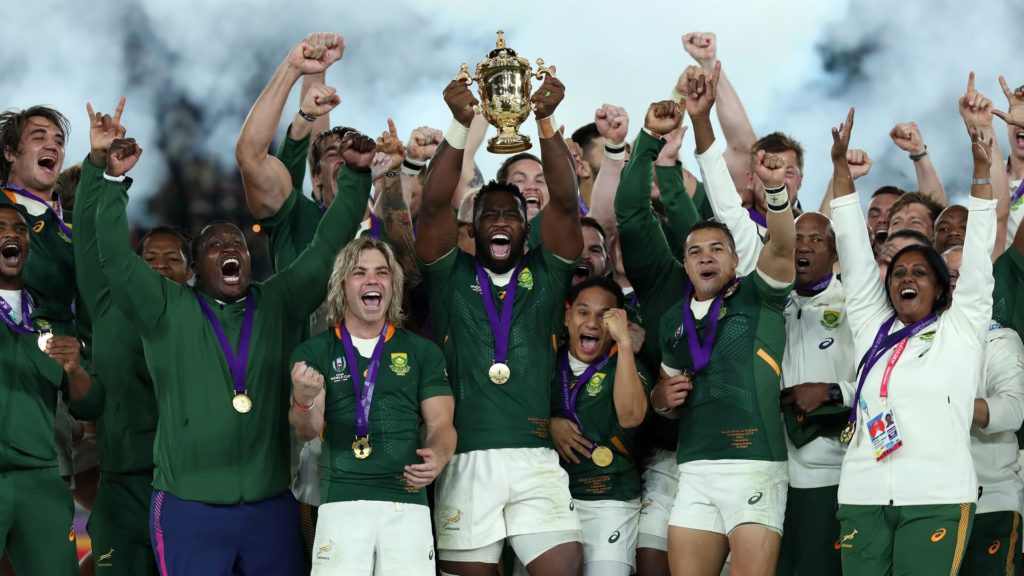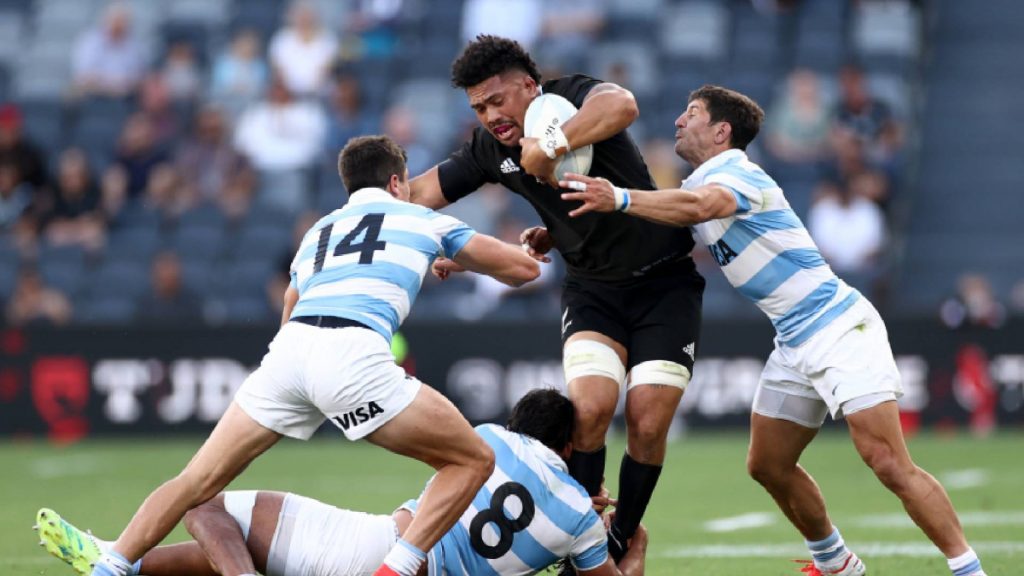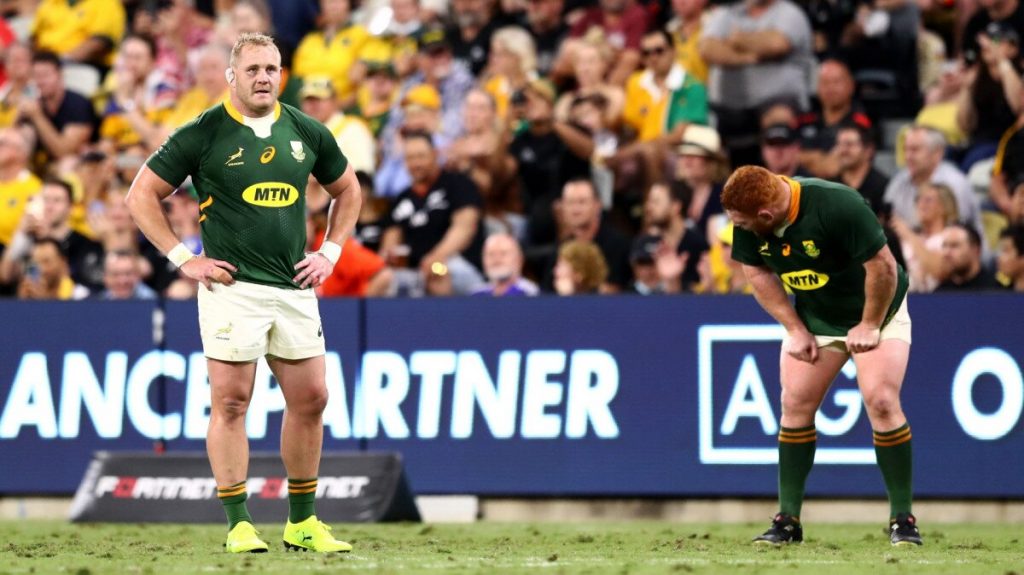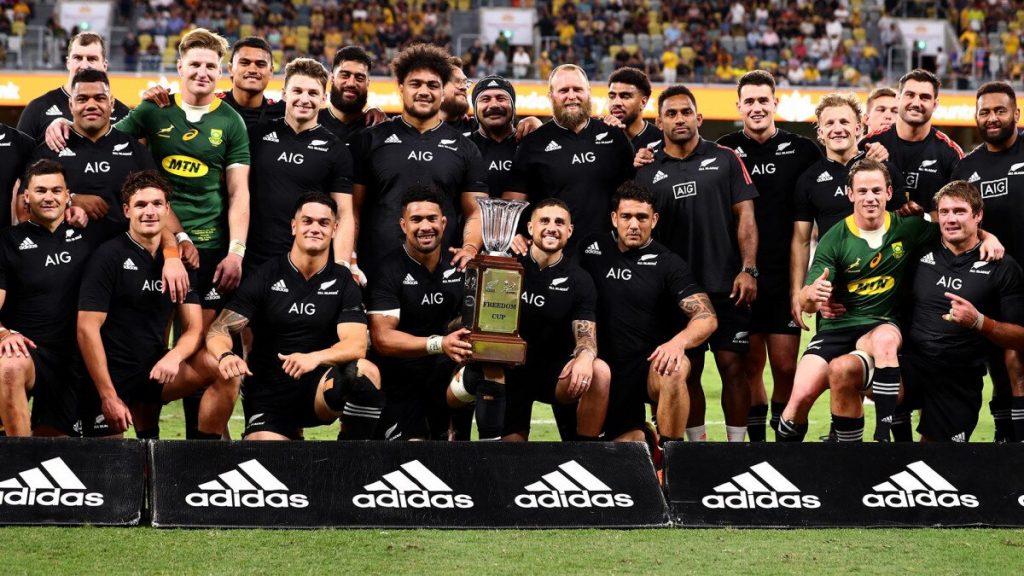If the Springboks could, they would probably admit to being a little relieved to have lost their world number one status.
They were highly protective of it in 2020, deciding to not play in the Rugby Championship for many reasons, one of which was they were grossly underprepared and feared they would lose ranking points unfairly.
No doubt, in the wake of being crowned world champions and ascending to the top of the rankings, it felt good to be there. Why wouldn’t it after all?
South Africa had plunged to previously unknown depths in 2017 when they were beaten 57-0 by the All Blacks and then lost to Italy a few months later.
The journey from there to the top of the world two years later was one of the great redemption stories and something inspirational for the country to tap into at a time of prolonged economic and political upheaval.

The much-respected Rassie Erasmus had taken over the team in 2018 and rebuilt from the ground up – reconnecting the players with each other and more importantly, with what it meant to be a Springbok and represent South Africa.
He famously revealed at the World Cup, after losing the opening pool game to the All Blacks, that his team reset, having become aware that they were applying too much pressure on themselves to bounce back and win the tournament.
“We were quite honest with one another about that,” he said. “We started to talk a lot about what is pressure.
“In South Africa, pressure is not having a job or if one of your close relatives is murdered. In South Africa there are a lot of problems, which is pressure. We started talking about things like that.
“Rugby shouldn’t be something that creates pressure; it should be something that creates hope. We have a privilege of giving hope – it’s not a burden.”
Strangely, the legend of the Boks only grew in 2020 despite them not playing. Seeing even the All Blacks struggle enhanced this idea of the Springboks as the best – the team with the players, the plan and the passion to dominate.
When the Boks conquered England in the final, it was one of those moments where there was universal appreciation for their achievement. They were the underdogs who had bitten harder than anyone could have imagined against quite significant odds.
Even many in England, disappointed as they were to lose in the final, appreciated the journey and significance of the Springboks’ win.
But two years on and some harder truths are perhaps dawning in the Republic and, in particularly, within the Springboks.
Having fought so hard to ascend the summit of the world game, Erasmus was determined for his team to stay there. With the country ravaged by the Covid pandemic in 2020, they didn’t have the chance to properly condition their players and play any tests.
It didn’t affect South Africa’s world ranking in the end because no country was able to mount a sustained period of form in their absence. Strangely, the legend of the Boks only grew in 2020 despite them not playing.
Seeing even the All Blacks struggle enhanced this idea of the Springboks as the best – the team with the players, the plan and the passion to dominate.

Collectively, the global rugby fraternity romanticised the Boks to some degree, remembered them as infallible almost, unstoppably powerful, cohesive and clear in how they wanted to play.
It meant that the Boks came into 2021 under pressure to live up to their world champion status – to remind everyone how good they were and set higher, consistent standards than had been seen in 2020.
The aura of the Boks was such that New Zealand Rugby’s board, by all accounts, wanted to delay any decision about whether to re-appoint head coach Ian Foster until the end of the Rugby Championship.
The board, supposedly, wanted to see how Foster handled the power and precision of the world’s best team before making an appraisal about his readiness to stay at the helm.
But what’s become clear in the last few months is that South Africa’s star no longer shines as brightly as it once did. They scored a coveted victory in the series against the British and Irish Lions, but it was such an ill-tempered, desperate, controversy-ridden affair as to swing public opinion against the Boks.
I looked on in horror last weekend at the sheer poverty and boredom from the South Africa team against Australia. Rugby was not — and is not — meant to be played like that and I’m just pleased Australia won
Sir Clive Woodward following the Springboks’ first loss to the Wallabies
The feel-good they engendered in 2019 has gone and there are two reasons why. One is that they are playing such a turgid, low-risk brand of rugby as to genuinely alienate the neutrals.
Their kick-chase, maul, tackle plan is effective, but hard to be excited by and there is a growing sense that they are damaging the ability of rugby to grow its global audience at a time when it really needs to be doing so.
How much wider opinion is turning against them was illustrated by comments made by former England coach Clive Woodward after the Wallabies had beaten the Boks for a second consecutive test in the Rugby Championship.
“I looked on in horror last weekend at the sheer poverty and boredom from the South Africa team against Australia,” Woodward wrote. “Rugby was not — and is not — meant to be played like that and I’m just pleased Australia won.
“The Boks’ series against the Lions was little better and it should worry everyone involved in the sport that rugby is going down that route. It will be dead in five years if it does.”
After losing to the All Blacks, it is unlikely the Boks, despite the pressure they exerted and the closeness of the game, will have won back much global respect.

While the Boks can play however they like, even they must have had a sense they weren’t on the right track when Faf de Klerk twice launched high kicks from almost inside the All Blacks 22.
They must, despite their insistence to the contrary, have had a post-game realisation that it was the wrong decision for Herschel Jantjies to kick high with two minutes remaining and give the ball to the All Blacks.
These three acts were indicative of a side that has given up entirely on pass and catch rugby and has wedded itself exclusively to living off opposition mistakes.
The Boks showed against the All Blacks that they can induce mistakes from even the best. They can exert effective pressure, swarm teams and smash their confidence by raining high balls down upon them, but while the Boks had the All Blacks scrambling and squirming in Townsville, it wasn’t enough to beat them.
That’s the real killer for them – their plan is only effective up to a point. The Boks have only beaten the All Blacks twice in their last 17 encounters. The Boks have played nine tests in 2021 and lost four. They can convince themselves that their plan is working, but results say otherwise. Results say that the Boks are the masters at wobbling the big pins, but not actually knocking them over.
This is a time-honoured trait in all sport – the champion side instantly becomes one everyone else targets and derides. And South Africa are being reminded that staying at number one comes with entirely different pressures to trying to get there.
As All Blacks coach Ian Foster said: “You can talk about pressure and about being strangled. We spoke a lot about the way the South Africans would play against us. It’s one thing to dismiss it as boring, which a lot of people do, but I used the words ‘ruthless’ and ‘clinical’ and they’re very good at it.
“Isn’t it good to learn that lesson and have a win next to your name? We’re really excited by not folding. We didn’t get too flustered, we kept playing. I’m overall happy and can’t wait for next week now.
The halo is slipping certainly and this derision about the way the Boks play is driven only partly by wider fears it is killing interest in the sport. The bigger driver is that as number one in the world, everyone now wants to knock them off their perch.
This is a time-honoured trait in all sport – the champion side instantly becomes one everyone else targets and derides. And South Africa are being reminded that staying at number one comes with entirely different pressures to trying to get there.
It took them 20-plus tests to get there and just eight to be knocked off. Being the best comes with heightened expectations. There is nowhere to hide – no foundation to play the underdog card and deflect the pressure.
It’s a tough, tough place to be and many teams get there and find they don’t like it. They discover that they are happiest aspiring to be the best, but don’t like what they find when they get there.

Recent history suggests the Boks are by no means the only team that doesn’t enjoy being the favourites. Ireland had one of their best years in 2018, winning a Six Nations Grand Slam, a series in Australia and then a clean sweep of their Autumn tests.
One of those victories that November was against the All Blacks, who at the time were world number one and knew that even should they lose in Dublin, they would still be number one in the rankings.
Aware that the World Cup was less than a year away, All Blacks coach Hansen made a calculated gamble before that game to say that no matter what the rankings actually said, the team that won would be considered the favourites in Japan.
“It’s one and two so whoever wins it will be the best side in the world regardless of rankings – that’s the mental state that people will take out of it so it’ll be a goody,” Hansen said.
The All Blacks live in a constant world of expectation and whether they are the number one team in the world or number four, they are still expected to win.
“We don’t have to talk about it, there’s enough experience in the group to know they don’t get any bigger. You don’t get to play one and two that often when they’re in separate hemispheres so when they do come about they become pretty big games. There’s a fierce rivalry there.”
Hansen knew that the last thing Ireland wanted in World Cup year was expectation heaped upon them. They are a country, much like their Celtic brothers, happy only as the hunter never as the hunted and they duly fell apart in 2019.
What Hansen also knew is that the All Blacks live in a constant world of expectation and whether they are the number one team in the world or number four, they are still expected to win.
Probably, the All Blacks are the only team in the world that is comfortable being the one everyone wants to beat: of going into every game as the favourites.
They are not afraid of the pressure that comes with success – something the Boks can’t yet say.



A good read. The short version is the Boks were a very good team reimagined as a great team. Entered the world cup ranked 4th, lost by 10 to the ABs, snuck past Wales in an extremely tight semi and fabulously smashed an England side that had played their final the week before in the final. One top shelf performance doth not a dynasty make. They showed themselves to be a top 3-ish in the world side then, and they are a top 3-ish side now. They're also getting a bit old. The Romanticising of the Boks is a spot on way to frame how they've been bigged up. NZ are better and will probably win again this week, but the gap isn't big and the Boks make take it (taking the #1 ranking back in the process).